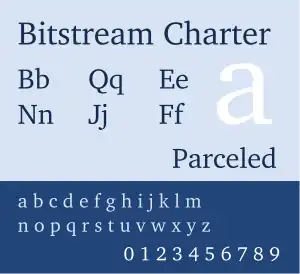 | |
| Category | Serif |
|---|---|
| Classification | Transitional serif Slab-Serif |
| Designer(s) | Matthew Carter |
| Foundry | Bitstream Inc. |
| Date created | 1987 |
| License | Permissive[1] for original version; proprietary for "Charter BT" version |
Bitstream Charter is a serif typeface designed by Matthew Carter in 1987 for Bitstream Inc.[2] Charter is based on Pierre-Simon Fournier’s characters, originating from the 18th century.[3] Classified by Bitstream as a transitional-serif typeface (Bitstream Transitional 801), it also has features of a slab-serif typeface and is often classified as such.[4][5]
Charter was originally optimized for printing on the low-resolution 300 dpi laser printers of the 1980s, and remains suitable for printing on both modern high-resolution laser printers and inexpensive lower resolution inkjet printers due to its strong, legible design. Its structure was optimised for low-memory computers and printers. In a 2013 interview, Carter explained that it used "a very simplified structure and a minimum number of curves, more straight-line segments... very economical compared to, say, Times New Roman," but noted that rapid development of printers made this unnecessary even before he had finished the design.[6] In its simplification of serif forms, it foreshadowed Carter's later landmark design, Georgia for Microsoft.
In 1992 Bitstream donated a version of Charter, along with its version of Courier, to the X Consortium under terms that allowed the font to be modified and redistributed. This has resulted in open source derivatives of Bitstream Charter, including Charis SIL.[7] Some[8] consider Bitstream Charter to be one of the best free fonts available.[9]
Because of its popularity, a new Charter Pro release of the typeface was released in 2004, with an expanded character set including additional symbols, ranging figures (old-style) and small capitals.[10] This version was later added as a system font on OS X.
Carter was later asked by Monotype to consider releasing a sans-serif companion to Charter. Finding his attempts unsatisfying, he scrapped the idea for a more radical, less directly complementary design, Carter Sans.
History
Charter is based on the characters[3] of Pierre-Simon Fournier, a French 18th century punch-cutter, typefounder and typographic theoretician who invented the “point system”, a standardized measurement system for font sizes.

References
- ↑ "Bitstream Charter".
- ↑ "Typedia: Charter". Typedia. Archived from the original on 11 August 2015. Retrieved 24 September 2014.
- 1 2 Miñoza, Nicole (20 May 2014). "Introducing Source Serif: A new open source typeface from Adobe". Adobe Typekit Blog. Adobe Systems Incorporated. Retrieved 27 June 2014.
- ↑ "Charter Postscript Font Metrics". Comprehensive TeX Archive Network (open source:one of many sources). Retrieved 29 September 2014.
- ↑ Sharpe, Michael (July 2014). "Recent Additions to TeX'sFont Repertoire" (PDF). Presentation to TUG, Portland. Archived from the original (PDF) on 2016-03-03. Retrieved 2014-09-29.
- ↑ Middendorp, Jan. "Matthew Carter interview". MyFonts. Monotype. Retrieved 28 September 2014.
- ↑ Stephen Gildea (March 29, 1992). "Bitstream contributes Type1 outlines for Charter and Courier fonts". Newsgroup: comp.archives. Usenet: r3j0kINNa64@agate.berkeley.edu. Retrieved August 1, 2013.
- ↑ "Charter | Butterick's Practical Typography". practicaltypography.com.
- ↑ Butterick, Matthew (2013). "Charter". Butterick’s Practical Typography. Retrieved August 1, 2013.
- ↑ "Charter Pro". MyFonts. Monotype. Archived from the original on 6 October 2014. Retrieved 28 September 2014.
External links
- Original Bitstream Charter Type 1 font maintained by the X.Org Foundation
- Free Bitstream Charter as OTF, TTF and webfonts
- Updated Bitstream Charter for sale on MyFonts
- Graphic Content: Carter Sans, by Steven Heller, New York Times, February 2, 2011